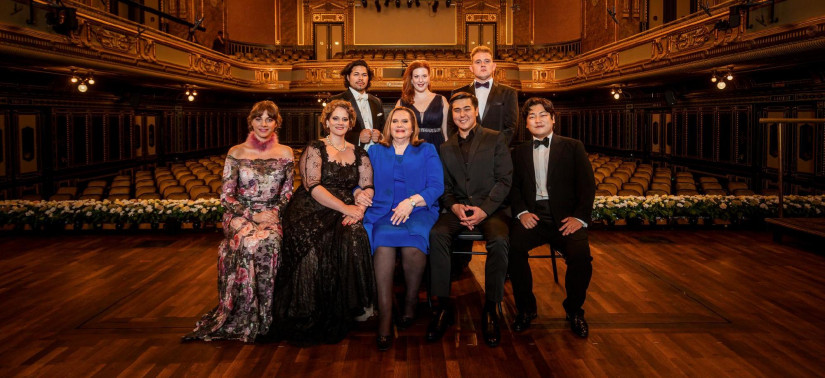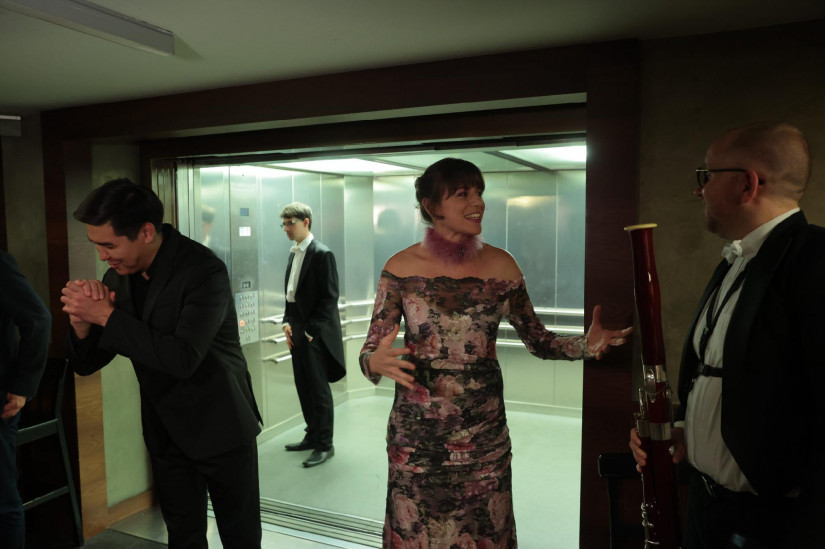“They came with pure hearts and intentions and offered us truly valuable moments.”
The atmosphere was excellent at this year’s Éva Marton International Singing Competition, with performers competing not against each other, but for the chance to perform, says the Liszt Academy Professor Emerita after the competition named for her.

In various interviews and on various platforms during the pandemic, you often advised the contestants to just sing and that all that was expected of them was to practise and grow despite the forced break. Now that the competition became a reality after a year, did their vocal performances show that they had made the most of the time that had passed? Did they satisfy your request?
É.M.: In my estimation, they did. I didn’t notice any rust in their voices. Continuity is very important, especially for an artist. You always have to practise, no matter what art form it is, from the visual arts to the theatre. This also applies, of course, to a student who is still preparing to take the stage at some point, but who may already have work, as is often the case. So the most important thing in our lives is to prepare at an even pace. One of the contestants had a little cold, but he very cleverly “raised” his voice, as it were, so he moved his voice a bit towards his head, which takes some strain off the vocal cords.
“I can't wait to be surprised,” you said in your welcome address to the contestants at the draw to determine the order of appearance. Did that happen?
É.M.: Of course. I saw and heard them live. As they came on stage, you could sense their personality, behaviour and attitude, and how important these three factors were to them and how much they cared about selling themselves to the audience in a good sense. When I asked them to surprise me, I thought, now is my chance, so far I have only experienced their voices, not so much their faces, expressions and gestures. During the preselection, I was mostly focused on the audio material, and all I was able to do was to say if a particular candidate was right for the competition. But all the rest, what’s beyond that, was revealed later, that is, only at the competition.
How do people from all over the world sing Liszt songs?
É.M.: Better and better. And why is that? Because they all see the point more clearly. In such simple songs, for example, Franz Liszt can bring together heavenly and earthly love, displaying it in his music with particular sounds. This duality existed in him all his life, and anyone who is not touched by it cannot be called an artist. But I found that this sensitivity was present in most of the performances I heard here. Liszt is one of my favourite composers, and I am happy every time a song I haven't heard is sung at a competition. It is important to add that our contestants had the opportunity to sing at the institution that Liszt founded almost one hundred and fifty years ago and whose basic idea comes from him and has remained unchanged for centuries: to help young talents, whether they sing or play instruments, regardless of their financial situation.
Overall, how did the epidemic affect the fourth competition beyond the need to postpone?
É.M.: For my part, I have come to appreciate factors I used to take for granted in the past, for example, what those few minutes they spend on the stage convey to me, to the jury, to the audience. These are truly valuable moments that we are offered live by a performer, in this case an opera singer. As for the contestants, I felt that they came with pure hearts and intentions, and the way they performed, this sense almost increased tenfold in me.
How was this community of competitors? Budapest saw a truly diverse team of representatives from 26 countries. Even during the competition, it seemed from time to time that they were rooting for each other like a family.
É.M.: I noticed that the atmosphere was excellent, as you can see from the videos posted on the Internet. It was radiant, you could feel it on stage. I didn’t go backstage myself because you are not supposed to disturb the contestants. Based on the feedback, there was a very pleasant and relaxed atmosphere among the contestants in the sense that they weren’t tense, they weren’t partial, they came to form a community. Each of them fought for one noble goal: not to compete against each other, but to perform in addition to winning prizes. It’s a huge desire, it’s in every performer, even famous singers or jury members: “I can do something you may not have noticed, but I can show you.” I believe art makes people better, more spiritually beautiful, more clever, more cultured. That’s the job of art. It evens out the differences between people with different mindsets.

By the way, it was very difficult to hold myself back until the end of the competition. I couldn’t make any gestures, I couldn’t comment on anything. I had to completely withdraw until the final moments, until the awards ceremony. I’m always afraid that people will judge me differently than I really am. Especially at a competition like this: they don’t feel as if I’m with them, perhaps a lot of people may have too much respect for me or are afraid of me because they don’t know me. But jury members are not allowed to be friends with the contestants during a competition.
But working in the jury room must have been a different experience, as you have decades of friendship between you.
É.M.: The members of the jury formed a community, which I think is quite uncommon in competitions around the world. If there was a debate or a difference of opinion, we listened to each other and decided together. On one occasion, I said, look, I’m going to exercise my rights as chair here and add my point to that singer’s performance, and they accepted that.
What message do you have for contestants who are thinking about or planning to come to the fifth competition in 2022?
É.M.: Come, take a risk, be bold, prepare yourself. It’s worth it because every single contestant wins here. If nothing else, they gain experience they might not have if they hadn’t come. Chances are that the young people here will keep in touch with each other because we saw them forge a community. I believe they will approach what they do differently, perhaps because they received so much love from the audience. All this will motivate them to give even more, to be even truer, and to always be immersed in the performance, in other words, to shine like a star in the sky.


